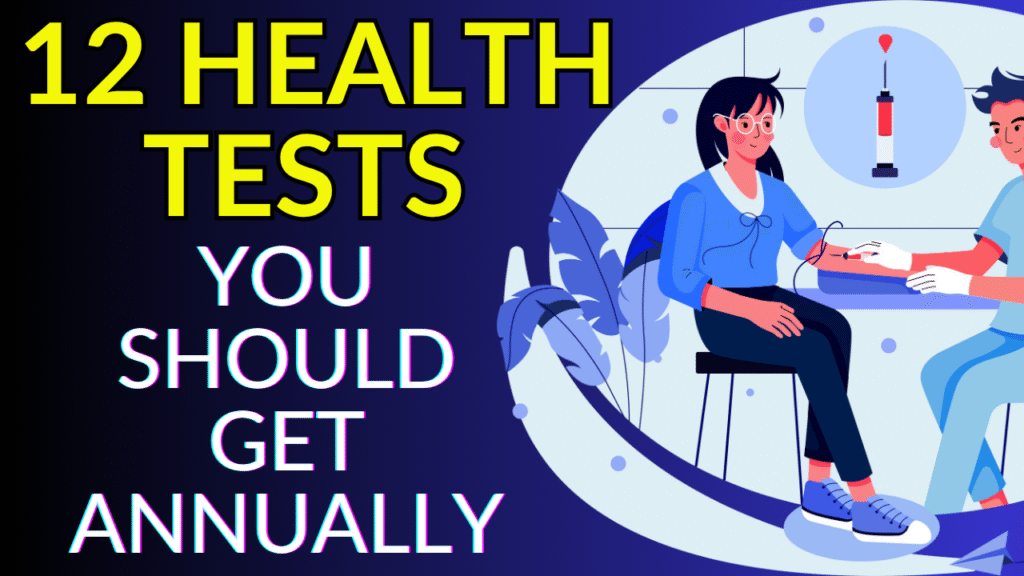
Regular health check-ups are crucial for maintaining a healthy, long life, whether you’re 20 or 60.
Annual health tests can detect potential issues early, helping you prevent serious conditions like heart disease, diabetes, and cancer. In this article, we’ll explore 12 essential health tests you should never skip, backed by science, and optimized with SEO keywords to help you prioritize health and wellness and potentially save your life.
Why Annual Health Tests Matter
Preventive healthcare is the key to catching health issues before they become serious. Routine health screenings provide insights into your heart health, metabolic function, organ health, and more, allowing you to take proactive steps toward longevity and well-being. From blood pressure checks to cancer screenings, these tests are simple yet powerful tools for maintaining optimal health. Let’s dive into the 12 must-have health tests you should get every year.
12 Essential Annual Health Tests for Optimal Wellness
1. Blood Pressure Test
High blood pressure (hypertension) is a silent threat that can damage arteries and lead to heart disease, stroke, or kidney problems.
- Why It Matters: Annual blood pressure checks monitor your cardiovascular health and detect hypertension early.
- How It’s Done: A quick, non-invasive test during your annual check-up.
- Pro Tip: Maintain a heart-healthy diet and exercise to keep blood pressure in check.
2. Cholesterol Screening
High cholesterol increases the risk of heart attacks and strokes without obvious symptoms.
- Why It Matters: Measures LDL (bad cholesterol) and HDL (good cholesterol) to assess heart disease risk.
- How It’s Done: A simple blood test during your annual visit.
- Quick Tip: Incorporate healthy fats like olive oil and omega-3s to support cholesterol levels.
3. Blood Sugar Test
Blood sugar tests detect early signs of diabetes or prediabetes, critical for those with a family history of diabetes.
- Why It Matters: Early detection prevents complications like nerve damage and cardiovascular issues.
- How It’s Done: A fasting blood glucose test or A1C test annually.
- Pro Tip: Maintain a low-sugar diet to stabilize blood sugar levels.
4. Body Mass Index (BMI) Measurement
BMI is a screening tool to assess whether you’re at a healthy weight.
- Why It Matters: Identifies risks for heart disease, diabetes, or hormonal imbalances linked to being overweight or underweight.
- How It’s Done: Calculated using height and weight during your check-up.
- Quick Tip: Combine balanced nutrition and exercise to maintain a healthy BMI.
5. Full Blood Count (CBC)
A Full Blood Count provides a comprehensive overview of your health.
- Why It Matters: Detects anemia, infections, inflammation, and early signs of cancer.
- How It’s Done: A routine blood test analyzing red blood cells, white blood cells, and platelets.
- Pro Tip: PairCBC with a nutrient-rich diet to support blood health.
6. Liver Function Test
Your liver detoxifies the body, and liver function tests monitor its health.
- Why It Matters: Detects liver disease or damage, especially for those with alcohol use or liver history.
- How It’s Done: A blood test measuring liver enzymes and proteins.
- Quick Tip: Limit alcohol and eat cruciferous vegetables to support liver health.
7. Kidney Function Test
Kidneys filter waste, and kidney function tests ensure they’re working properly.
- Why It Matters: Detects early signs of kidney dysfunction or kidney failure.
- How It’s Done: Measures creatinine and blood urea nitrogen (BUN) via a blood test.
- Pro Tip: Stay hydrated and reduce sodium intake for healthy kidneys.
8. Thyroid Function Test
The thyroid regulates metabolism, and imbalances can cause fatigue, weight changes, or mood issues.
- Why It Matters: Detects hypothyroidism or hyperthyroidism for timely treatment.
- How It’s Done: A blood test measuring thyroid hormones (TSH, T3, T4).
- Quick Tip: Include iodine-rich foods like seaweed to support thyroid health.
9. Cancer Screenings
Early detection of cancer saves lives.
- Why It Matters: Mammograms (breast cancer), Pap smears (cervical cancer), and PSA tests (prostate cancer) catch issues early.
- How It’s Done: Age- and gender-specific tests recommended annually or as advised.
- Pro Tip: Discuss your family history with your doctor to tailor cancer screenings.
10. Skin Cancer Check
Skin cancer is common but treatable when caught early.
- Why It Matters: Detects suspicious moles or skin changes to prevent advanced melanoma.
- How It’s Done: Annual dermatologist exam for a thorough skin check.
- Quick Tip: Use sunscreen and avoid excessive sun exposure to protect your skin.
11. Vision Test
Vision tests detect issues like glaucoma, macular degeneration, or cataracts before they worsen.
- Why It Matters: Preserves eye health and prevents vision loss.
- How It’s Done: An annual eye exam with an optometrist or ophthalmologist.
- Pro Tip: Wear UV-protective sunglasses to support healthy vision.
12. Hearing Test
Hearing loss can develop gradually, especially with noise exposure or aging.
- Why It Matters: Early detection prevents further damage and preserves hearing ability.
- How It’s Done: An annual hearing test by an audiologist.
- Quick Tip: Use ear protection in loud environments to safeguard hearing health.
Why You Should Prioritize Annual Health Tests
Annual health tests are your first line of defense against chronic diseases like heart disease, diabetes, cancer, and organ dysfunction. By catching issues early, you can take proactive steps through lifestyle changes, diet, or medical intervention to stay healthy. These simple screenings provide critical insights into your health and wellness, empowering you to live a longer, healthier life.
Which health test are you prioritizing this year? Share your thoughts or tips for staying proactive about health check-ups in the comments, and let’s inspire each other to thrive!
